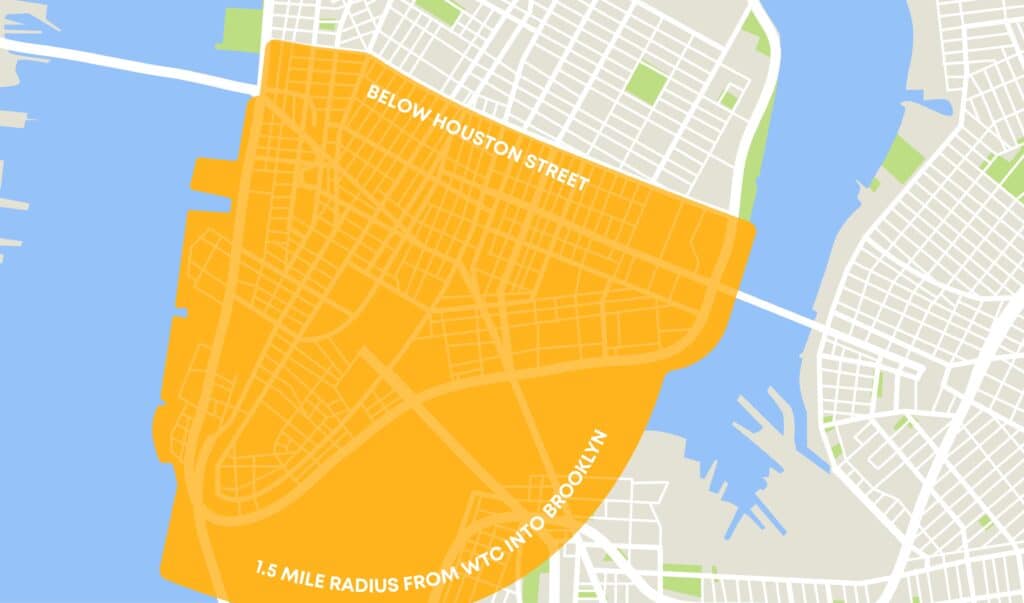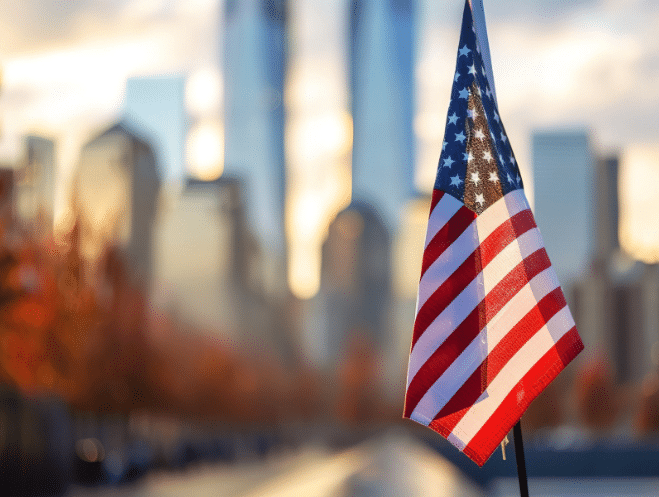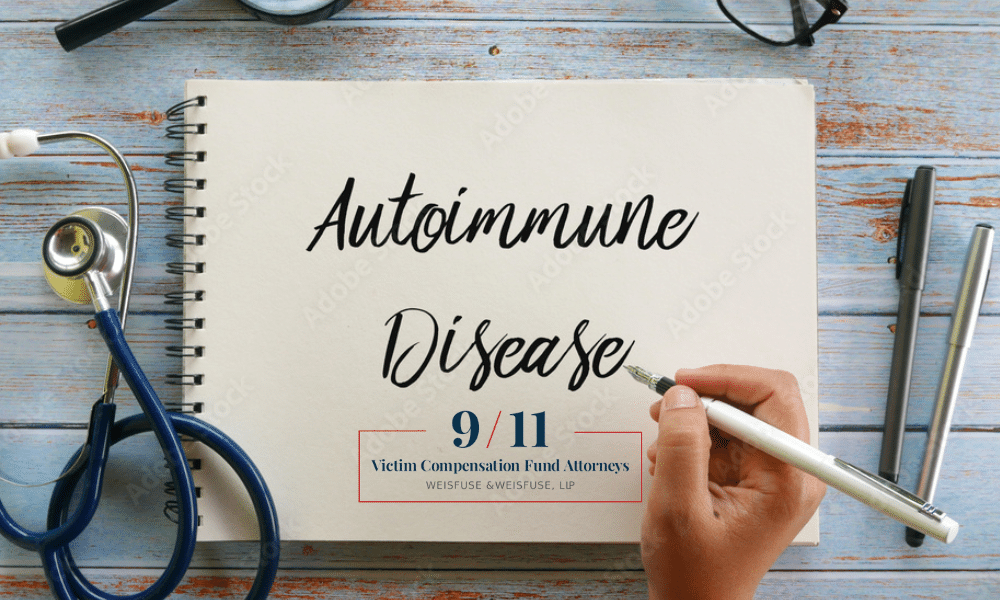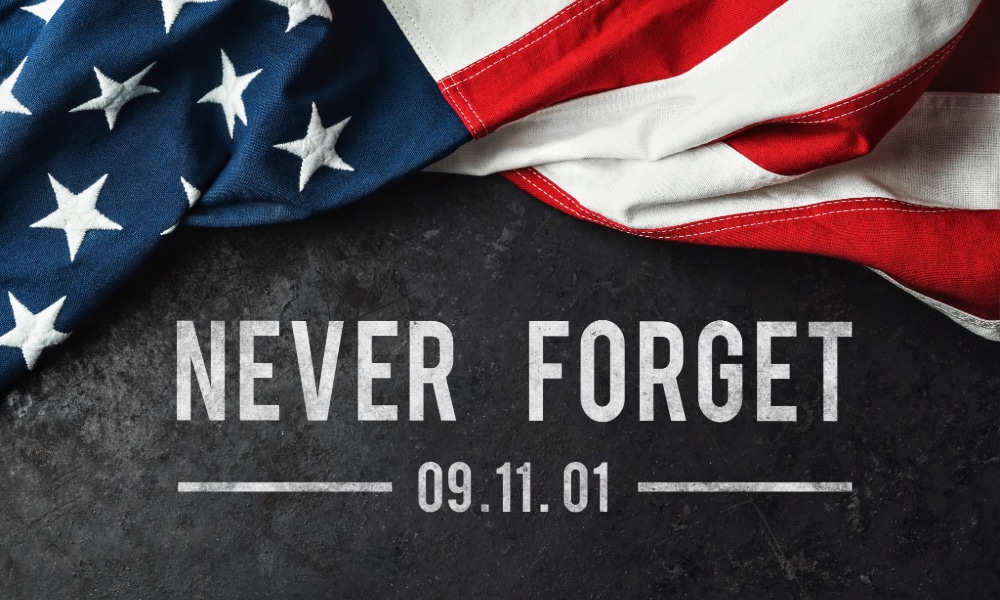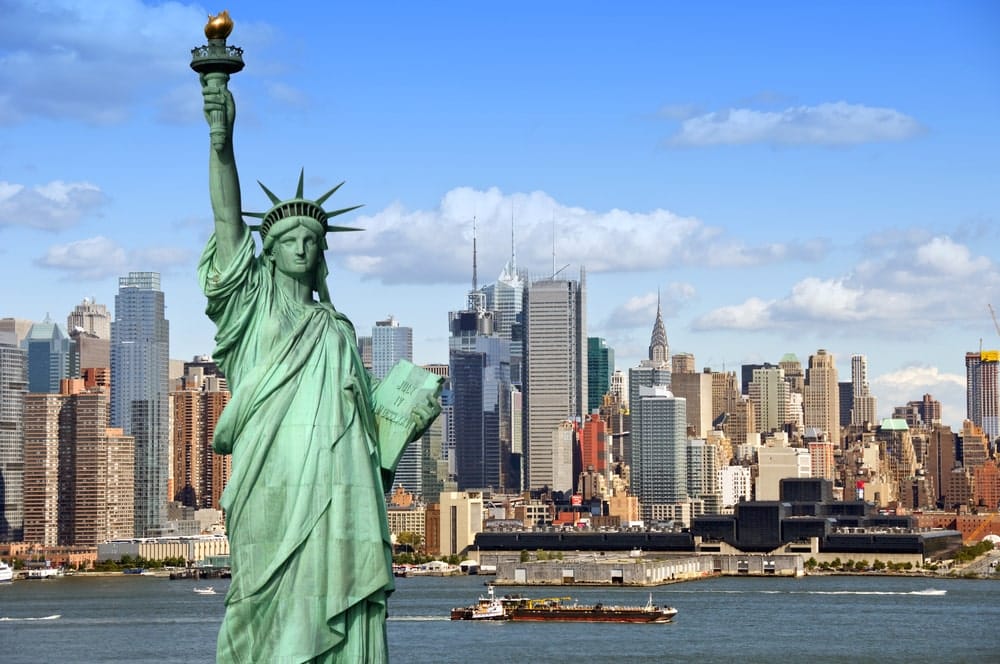
When the September 11, 2001 terrorist attacks occurred, few at the time could have predicted the serious, long-term effects the attacks would have on the physical and mental wellbeing of people who lived, worked, or simply happened to be in the vicinity of the attacks between September 11, 2001 and May 30, 2002. In New York City, this is the area known as the New York City Exposure Zone, which includes Manhattan south of the line that runs from Houston Street**, along Canal Street from the Hudson River to the intersection of Canal Street and East Broadway; north on East Broadway to Clinton Street; east on Clinton Street to the East River; and any area related to or along the debris-removal routes, including barges and Staten Island’s Fresh Kills landfill.
For some, the medical issues began almost immediately. Mysterious respiratory problems, cancers, and other conditions that could not be traced to anything but the person’s time in the NYC 9/11 Exposure Zone occurred. Those who had responded to the World Trade Center and took part in the rescue, recovery, and clean-up efforts were among the first to develop health issues.
Among the many thousands of people affected by their time in the NYC Exposure Zone was New York Police Department (NYPD) Officer James Zadroga. Officer Zadroga responded to the call on September 11 alongside his fellow officers. He then spent 450 hours working on “the pile” as part of the recovery efforts.
Who was James Zadroga?
James Zadroga was the first NYPD officer whose death was attributed to contact with the toxic dust from the WTC collapse. But more than that, he was a father, a husband, and a son.
NYPD Detective James Zadroga grew up in North Arlington, New Jersey—where his dad was the town’s police chief. In the immediate aftermath of the 9/11 attacks, he was reassigned to WTC recovery and cleanup, where he put in more than 500 hours of work. By December of 2001, he was experiencing severe breathing difficulties. He transferred to Manhattan South Homicide division, yet his condition continued to worsen. By 2004, he could no longer work and retired on disability, eventually requiring a wheelchair and round-the-clock oxygen.
In addition to his medical issues, James Zadroga’s wife became ill, suffering from an illness and overcome by the stress of her husband’s deteriorating health. She died in 2005. Just one year later, James Zadroga succumbed to his 9/11 illness, leaving behind a young daughter. He was only 34 years of age.
9/11 Health Issues Begin
Prior to the September 11, 2001 attacks and his time working at the World Trade Center site, Officer Zadroga was in good health. A non-smoker, he had no known history of asthma or any other respiratory conditions.
That changed in the weeks after his time working at Ground Zero. He developed a cough, then shortness of breath, and eventually became unable to walk more than a short distance without losing his breath.
In 2004, Officer Zadroga was awarded more than one million dollars by the September 11th Victim Compensation Fund, after it was determined that his respiratory illness was caused by exposure to dust at the World Trade Center site. He was also awarded permanent disability retirement by the NYPD medical board, which also found that his respiratory illness was the result of exposure to dust at Ground Zero.
On January 5, 2006, Officer Zadroga died – just one month shy of his 35th birthday.
The medical examiner in Ocean County, New Jersey conducted an autopsy and determined the cause of death to be directly related to Officer Zadroga’s time at Ground Zero. However, the Office of the Chief Medical Examiner of New York City contradicted those findings, claiming instead that Officer Zadroga’s death was not due to his exposure to dust at Ground Zero but instead from self-injection of prescription drugs which caused scarring in his lungs.
Officer Zadroga’s family obtained a third opinion on his autopsy results. The chief forensic pathologist of the New York State Police – himself a former New York City medical examiner – agreed with the original findings of the autopsy, reporting that the cause of death was related to dust from the World Trade Center site.
By the time of Officer Zadroga’s death in January 2006, less than five years after the attacks, numerous other people had been diagnosed with, or were already beginning to suffer from, various respiratory and other illnesses resulting from their being in the vicinity of the World Trade Center in the days, weeks, and months following the September 11 terrorist attacks. This included first responders from the NYPD, Fire Department of New York (FDNY), Port Authority, Emergency Medical Services (EMS), and other police and fire departments from outside the five boroughs who had answered the call to help.
In the years since Officer Zadroga’s death, thousands more have become sick and died of 9/11-related illnesses and conditions. In addition to first responders, many people who lived, worked, or attended school within the NYC Exposure Zone at any time in the nine months following the attacks have been diagnosed with a range of physical and mental health issues that can be traced directly back to the 9/11 attacks.
The long-term effects of high exposure to Ground Zero dust
As stated in the scholarly International Journal of Environmental and Public Health, “The toll of 9/11 includes the continued impact of accumulated health effects among those who were directly exposed to either the air pollution or re-suspended material that resulted from the collapse of the (twin towers)…this includes a wide range of physical and mental health disorders that continue to plague thousands of people 18 years later as well as newly identified conditions emerging as a result of prolonged disease latency.”
The most common conditions associated with high exposure to the toxic dust from the WTC collapse include an acute respiratory condition called “WTC Cough Syndrome.” For many, that cough turned into chronic rhinosinusitis, asthma, and/or bronchitis, as well as gastroesophageal reflux dysfunction (GERD), a digestive disorder that affects the ring of muscle between the esophagus and the stomach. Other conditions associated with extended exposure to the toxic dust and certified by the World Trade Center Health Program include:
- Blood and lymphoid tissue diseases, including leukemia, myeloma, and lymphoma
- Respiratory / lung cancers
- Mesothelioma
- Colorectal and urinary system cancers
- Breast and ovarian cancer
- Prostate cancer
- Cancers of the skin, eye, head and neck, and soft and connective tissues
- Childhood cancers and certain rare cancers
Non-cancer medical conditions also include sleep apnea, new-onset and/or reactive COPD, and reactive airway dysfunction syndrome (RADS), among others.
More recently, researchers at Mt. Sinai have found evidence linking an increased risk of liver disease to “the quantity of toxic dust the workers were exposed to, which was greatest immediately after the September 11, 2001, attacks.”
What was the Zadroga Act 2015?
In 2011, President Obama signed a bill bearing Zadroga’s name—the James Zadroga 9/11 Health and Compensation Act (commonly called the Zadroga Act)—into law, to provide medical monitoring and treatment for survivors and compensation to those who were injured or died during the attack. On October 1, 2015, the original Zadroga Act expired. Through the efforts of both private citizens and public officials, the act was reauthorized.
2019 James Zadroga 9/11 Health and Compensation Reauthorization Act
First introduced in 2009, the James Zadroga 9/11 Health and Compensation Act of 2010 was passed by Congress in late 2010 and signed into law by then President Barack Obama on January 2, 2011, nearly ten years after the September 11 attacks. The James Zadroga 9/11 Health and Compensation Act provides health monitoring and financial support for 9/11 first responders and survivors suffering from a specific list of medical issues and conditions.
The Act was reauthorized in December 2015, with coverage extended 75 years. Officially known as the James Zadroga 9/11 Health and Compensation Reauthorization Act, it is also referred to as the Zadroga Act 2015.
However, in early 2019, the Special Master administering the September 11th Victim Compensation Fund announced that there was “not enough funding to pay all pending and projected claims,” and that monetary awards would be reduced to ensure the Fund did not run out of money. In June 2019, 9/11 first responders, joined by comedian and former “Daily Show” host Jon Stewart – who had advocated for 9/11 first responders for several years – testified before the House Judiciary Committee demanding the allocation of additional funding.
The Committee then passed a bill permanently reauthorizing funding for the September 11th Victim Compensation Fund.
In addition to James Zadroga, two names have been added to the act: FDNY firefighter Ray Pfeifer, who died from 9/11 cancer in 2017, and Luis Alvarez, an NYPD bomb squad detective, who also passed away after a battle with 9/11 cancer in 2019.
The James Zadroga Act: The Legacy of a Hero
Even after his death, Officer Zadroga’s commitment to the people who live, work, and visit New York City continues. Despite his young age, Officer Zadroga made a lasting impact on the lives of people he never even met. People who initially seemed healthy but have since been diagnosed with 9/11-related physical and mental health issues can now receive the help and support they need.
If you or a loved one were in the New York City Exposure Zone between September 11, 2001 and May 30, 2002 and are suffering from health issues that you believe may be related to the September 11 attack on the World Trade Center and its aftermath, you may be entitled to compensation from the September 11th Victim Compensation Fund. Filing a claim with the VCF can be complicated due to the amount and types of documentation required and the timeline in which it must be submitted to prove that your health issue or issues are related to the September 11 terrorist attack.
The eligibility claim appeals process and the compensation appeals process are both complex and leave little room for error. It is best to have a September 11th Victim Compensation Fund lawyer on your side. The skilled lawyers at Weisfuse & Weisfuse, LLP have extensive experience fighting on behalf of those who suffered injuries or illnesses due to the September 11 terrorist attacks and the rescue, recovery, and clean-up efforts at Ground Zero, as well as anyone who lived, worked, or attended school within the New York City Exposure Zone during the designated time following the attacks. We stand ready to support you in your September 11th Victim Compensation Fund case.
If you have become ill after 9/11 exposure a 911 attorney can help
As of mid-2021, nearly 82,000 first responders and more than 30,000 survivors have enrolled in the World Trade Center Health Program to get the medical treatment and monitoring they need. Additionally, some $1.6 billion was awarded by the September 11th Victim Compensation Fund in 2020, to put the total dollars awarded at $7.76 billion.
These are benefits that every survivor, or every family who has lost a loved one to a 9/11 illness, needs. If the process seems daunting, or if you need help applying for benefits or assistance with a denied claim, an experienced 9/11 attorney can get you over the hurdles so you can get the healthcare assistance and the full and fair compensation that you are owed. While you have until 2090 to file a September 11th Victim Compensation Fund claim, it is in your best interest to register with the September 11th Victim Compensation Fund as soon as possible. While the July 2021 deadline for registration has passed, it is important to note that the registration deadline is not the same for everyone. As lawyers with deep experience in assisting 9/11 survivors, we know how to help ensure that you get the best possible outcome with your claim.
Contact a Weisfuse & Weisfuse, LLP September 11th Victim Compensation Fund attorney today
Getting 9/11 benefits starts with a free and confidential consultation with one of our skilled and knowledgeable September 11th Victim Compensation Fund lawyers. To schedule a time to discuss your needs and concerns, please contact us online.
** Numerous advertisements and media outlets are informing New Yorkers about their possible eligibility for 9/11 benefits if they were in Lower Manhattan** during the attacks and suffer from health conditions due to toxic dust exposure. At Weisfuse & Weisfuse LLP, we emphasize that the “exposure zone” isn’t limited to Canal Street but can extend further to Houston Street.
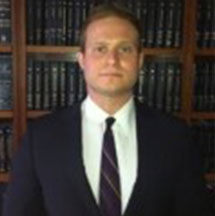
About Jason Weisfuse –
9/11 Victim Compensation Fund Attorney
About Jason Weisfuse –
9/11 Victim Compensation Fund Attorney
Jason E. Weisfuse is a seasoned 9/11 cancer attorney and managing partner at Weisfuse & Weisfuse, LLP, a New York City-based law firm dedicated to representing individuals affected by the September 11th attacks. Since the establishment of the September 11th Victim Compensation Fund (VCF), Jason has been instrumental in assisting first responders, survivors, and families in securing the compensation and medical benefits they deserve.
With a Juris Doctor from New York Law School (2009), Jason brings extensive experience regarding the 9/11 Victim Compensation Fund to his practice. His deep understanding of the VCF and the World Trade Center Health Program (WTCHP) has enabled him to navigate complex claims processes effectively, resulting in substantial awards for his clients.
Jason’s commitment to the victims in the 9/11 community is evident through his active involvement in professional organizations such as the New York State Trial Lawyers Association and the American Association for Justice. He has also contributed to legal discourse with publications in the New York Law Journal, reflecting his dedication to legal excellence and advocacy.
At Weisfuse & Weisfuse, LLP, Jason continues to provide compassionate and knowledgeable representation, ensuring that those affected by 9/11 receive the support and compensation they are entitled to.


